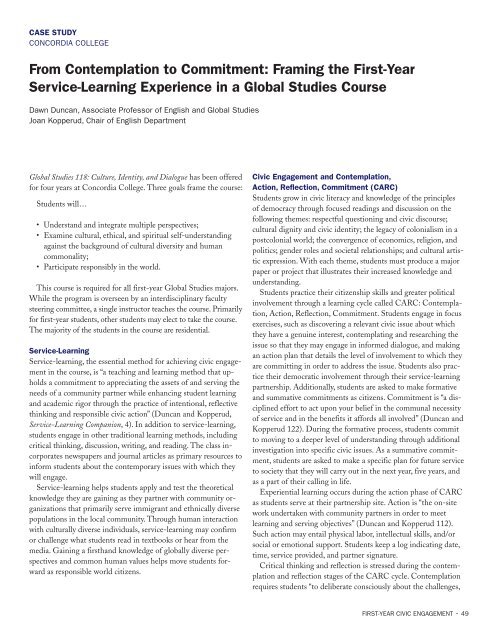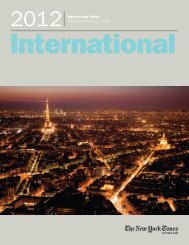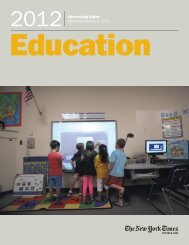First-Year Civic Engagement: Sound Foundations for College ...
First-Year Civic Engagement: Sound Foundations for College ...
First-Year Civic Engagement: Sound Foundations for College ...
Create successful ePaper yourself
Turn your PDF publications into a flip-book with our unique Google optimized e-Paper software.
CASE STUDYCONCORDIA COLLEGEFrom Contemplation to Commitment: Framing the <strong>First</strong>-<strong>Year</strong>Service-Learning Experience in a Global Studies CourseDawn Duncan, Associate Professor of English and Global StudiesJoan Kopperud, Chair of English DepartmentGlobal Studies 118: Culture, Identity, and Dialogue has been offered<strong>for</strong> four years at Concordia <strong>College</strong>. Three goals frame the course:Students will… against the background of cultural diversity and humancommonality; This course is required <strong>for</strong> all first-year Global Studies majors.While the program is overseen by an interdisciplinary facultysteering committee, a single instructor teaches the course. Primarily<strong>for</strong> first-year students, other students may elect to take the course.The majority of the students in the course are residential.Service-LearningService-learning, the essential method <strong>for</strong> achieving civic engagementin the course, is “a teaching and learning method that upholdsa commitment to appreciating the assets of and serving theneeds of a community partner while enhancing student learningand academic rigor through the practice of intentional, reflectivethinking and responsible civic action” (Duncan and Kopperud,Service-Learning Companion, 4). In addition to service-learning,students engage in other traditional learning methods, includingcritical thinking, discussion, writing, and reading. The class incorporatesnewspapers and journal articles as primary resources toin<strong>for</strong>m students about the contemporary issues with which theywill engage.Service-learning helps students apply and test the theoreticalknowledge they are gaining as they partner with community organizationsthat primarily serve immigrant and ethnically diversepopulations in the local community. Through human interactionwith culturally diverse individuals, service-learning may confirmor challenge what students read in textbooks or hear from themedia. Gaining a firsthand knowledge of globally diverse perspectivesand common human values helps move students <strong>for</strong>wardas responsible world citizens.<strong>Civic</strong> <strong>Engagement</strong> and Contemplation,Action, Reflection, Commitment (CARC)Students grow in civic literacy and knowledge of the principlesof democracy through focused readings and discussion on thefollowing themes: respectful questioning and civic discourse;cultural dignity and civic identity; the legacy of colonialism in apostcolonial world; the convergence of economics, religion, andpolitics; gender roles and societal relationships; and cultural artisticexpression. With each theme, students must produce a majorpaper or project that illustrates their increased knowledge andunderstanding.Students practice their citizenship skills and greater politicalinvolvement through a learning cycle called CARC: Contemplation,Action, Reflection, Commitment. Students engage in focusexercises, such as discovering a relevant civic issue about whichthey have a genuine interest, contemplating and researching theissue so that they may engage in in<strong>for</strong>med dialogue, and makingan action plan that details the level of involvement to which theyare committing in order to address the issue. Students also practicetheir democratic involvement through their service-learningpartnership. Additionally, students are asked to make <strong>for</strong>mativeand summative commitments as citizens. Commitment is “a disciplinedef<strong>for</strong>t to act upon your belief in the communal necessityof service and in the benefits it af<strong>for</strong>ds all involved” (Duncan andKopperud 122). During the <strong>for</strong>mative process, students committo moving to a deeper level of understanding through additionalinvestigation into specific civic issues. As a summative commitment,students are asked to make a specific plan <strong>for</strong> future serviceto society that they will carry out in the next year, five years, andas a part of their calling in life.Experiential learning occurs during the action phase of CARCas students serve at their partnership site. Action is “the on-sitework undertaken with community partners in order to meetlearning and serving objectives” (Duncan and Kopperud 112).Such action may entail physical labor, intellectual skills, and/orsocial or emotional support. Students keep a log indicating date,time, service provided, and partner signature.Critical thinking and reflection is stressed during the contemplationand reflection stages of the CARC cycle. Contemplationrequires students “to deliberate consciously about the challenges,







